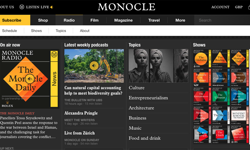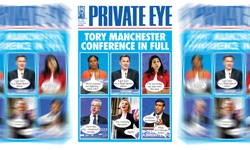News site, internet newspaper or news-themed social media platform? Even UK editor-in-chief, Carla Buzasi, admits to having at times struggled to describe exactly what The Huffington Post is. Two and a half years after the launch of its UK edition, however, all now is clear. "We start conversations," she says. "That's the heart of what we do."
Others' definition of The Huffington Post probably depends on who they are, of course. If you're one of its fast-growing number of regular readers - in October 2013, the UK site broke the 5m barrier with 5.1m unique visits, comScore figures show (the combined monthly figure for The Huffington Post's ten national editions now exceeds 100m) - it's a required daily fix of news, entertainment and opinion.
For the thousands of bloggers whose content it hosts - 8,000 UK bloggers feed content into the UK edition, alone - it's a powerful platform through which to access a wider audience. While for some seasoned media industry types, The Huffington Post's liberal use of unpaid for content from these aforementioned bloggers poses a potential threat to the value of professional journalism and journalistic standards.
Not that Buzasi has much truck with this final assessment.
As well as blog content, the UK site depends on journalistic content created by The Huffington Post UK's in-house team of 27 editors and reporters - many of whom cut their teeth at so-called 'traditional media' establishments such as the BBC, CNN, The Times and Daily Mail, she points out. As for the bloggers, well, their content might not be paid for but many are decision-makers, academics and experts.
"Starting conversations" means breaking news and talking about the issues of the day while for bloggers it's all about opinion, she says: "Put the two together and you have something really special. But The Huffington Post doesn't work with just one side of the coin: you have to have both."
Buzasi cut her teeth at Redwood Publishing and Condé Nast and then spent four years at Marie Claire as associate and online editor before joining AOL. She was first drawn to The Huffington Post as a source for feature ideas. And it was her familiarity with the product as a reader combined with her belief in its appeal to a younger demographic unwedded to any single particular news source or newspaper brand that persuaded her to approach co-founder Arianna Huffington for a job.
Persuading Arianna
"I was on my way to work when I read an email to staff from (AOL chairman) Tim Armstrong announcing AOL's plan to buy The Huffington Post (for a reported $315m)," she recalls. "By the time I had arrived, I'd tracked down Arianna's contact details and sent her an email…”
Buzasi introduced herself and set out her belief that Huffington should launch a UK edition. Within days, the pair had spoken by phone. And within hours of their first meeting in London - at which Buzasi presented a mocked up UK front page - Huffington announced the launch of The Huffington Post UK with Buzasi at the helm.
"There was already a certain brand equity established in the UK," Buzasi explains. "But what we needed to do was take the best of what was already being done in the US and overlay it with brilliant British journalism and excellent bloggers - do this right and I knew we'd have something really special."
The UK team had strong support from Huffington's US-based team who'd built the site since launch back in 2005 and had already extended the brand with a Canadian edition. Even so, as important as learning from the US experience was defining a market positioning appropriate for the UK.
"There was no point launching another news site if we were going to be exactly the same as everyone else," Buzasi says.
"But there was a real opportunity to bring news to a younger generation who've not grown up wedded to a single newspaper brand, in a way they understand - a generation with a smartphone clamped in either hand whose lives revolve around social media. The Huffington Post had already very cleverly exploited social in the US, so we set out to recreate that while ensuring a strong British authenticity."
The social strategy involves working with bloggers - providing a platform for their content as well as building audience through capitalising on bloggers' networks - and as a content aggregator of material appearing on other sites. "You could say we have hundreds of rivals - newspaper sites, blog sites, magazine sites. Or that we sit apart from them all because what we are trying to do is something different," she says.
Trusted curator
"But I think our strength - and what makes us different - is that we link out to what might be perceived as our competitors all the time sending traffic back The Guardian, Telegraph, Marie Claire and so on because if we see great content we want our users to see it. Part of what we do is curating content and if we do that well, people will come to us first because we're doing some of the hard work of the internet for them."
Another important pillar of The Huffington Post's social strategy is publishing content on social media platforms - the choice of which is dictated by type of content and target audience. "Traffic is driven by social media sites, and that is constantly evolving," she continues. "In just the past couple of years, we've seen the huge rise of Pinterest and Instagram - and the explosion of Google+, through which we now have more follows than on Twitter or Facebook."
The team must keep on top of latest social media trends at all times then test and play around with different platforms to refine a constantly evolving content strategy. So, the Lifestyle section has an Instagram account and also a strong following on Facebook while Politics gets more traffic from Twitter. "It's partly to do with driving traffic, partly because it's important to engage with users on a platform most relevant to them," Buzasi adds.
When 'Super Storm Sandy' hit the US in October 2012 and took down Huffington Post's servers and the website with it, the teams around the world simply posted the content that would have gone onto the website on social media, instead. "It was a neat demonstration that, if necessary, we can even run the site without the site," she laughs.
Native advertising
The net effect of all this is a highly engaged audience which The Huffington Post monetises through advertising - in particular, native advertising - thanks to which The Huffington Post UK was due to be breaking even by 2013's close. Native advertising is at the heart of what The Huffington Post has done since launch back in 2005 and, moving forward, she believes, it is the future of digital advertising.
"The mistake many are now making is saying native advertising is just a new way of saying 'advertorial'. But back when I wrote advertorials, they were totally brand-led and you could only get people to read them by offering prizes. Today, native advertising is nothing to do with what a brand wants to plug and all to do with content that has inherent value," Buzasi insists.
"Felix Baumgartner didn't have to talk about the brand because 'Red Bull Stratos' was a brilliant piece of content in its own right. And while you won't find a bottle of shampoo or shower gel in the Dove 'Real Beauty Sketches', that content made the men and women who watched it really think - and that's what made them think about the brand."
New initiatives
The Huffington Post is building a reputation as an innovator in other ways, too. Buzasi cites the recent launch of social video live streaming network HuffPost Live - into which the UK editors now regularly feed - and the recent launch of Conversations, a new online comment platform for the site. But one of her proudest achievements, she reveals, isn't digital at all.
"I was looking for a way to continue the conversations we have through digital with our users and decided live events would be a great way of doing that, so we launched Conversation Starters," she explains. Staged in partnership with universities and other third party organisations to discuss topical issues, these events have generated useful content, too, with live tweets, blogs and video streaming with edited highlights post-event.
Buzasi is also proud of some of the campaigning themes The Huffington Post has championed in recent months including Screen Sense (ironically, a call for people to spend less time on screen) and the Third Metric debate around finding new ways of defining 'success' beyond money and power.
It's not just about the UK site amplifying themes that come from the US, but feeding UK ideas and perspectives into what is - as The Huffington Post expands its portfolio of national editions - fast-becoming a global network. "The Huffington Post is very much a global entity now and we have cross-collaboration at different levels with all the different sites," she says.
And launching in 2014 will be World Post: a dedicated space on the site to which national editions and stringers elsewhere can submit content for a worldwide audience.
At a day to day level, all digital content producers share the same challenges - to keep driving numbers. And the key way of doing that is great content, Buzasi believes: "Because you can put as much time and resource as you like into creating something you think will go viral, but if you put that time and energy into creating great content it will go viral anyway."
It's all about social content. Which is why she's not a great believer in paywalls for anything other than specialist and niche content. "We are ad funded and I'd rather as many people visit us as can do so, rather than make that harder," she insists.
"The advantage we have in not having any old media products still bringing in revenue is that it makes decision-making easier. To a certain extent, news organisations with old and new media products must be prepared to cannibalise some of their old media revenues otherwise others will come along and do so for them. That's why The Huffington Post has had such success - because we are laser-focused on creating the best digital destination we can."












